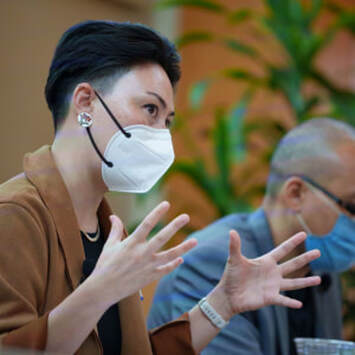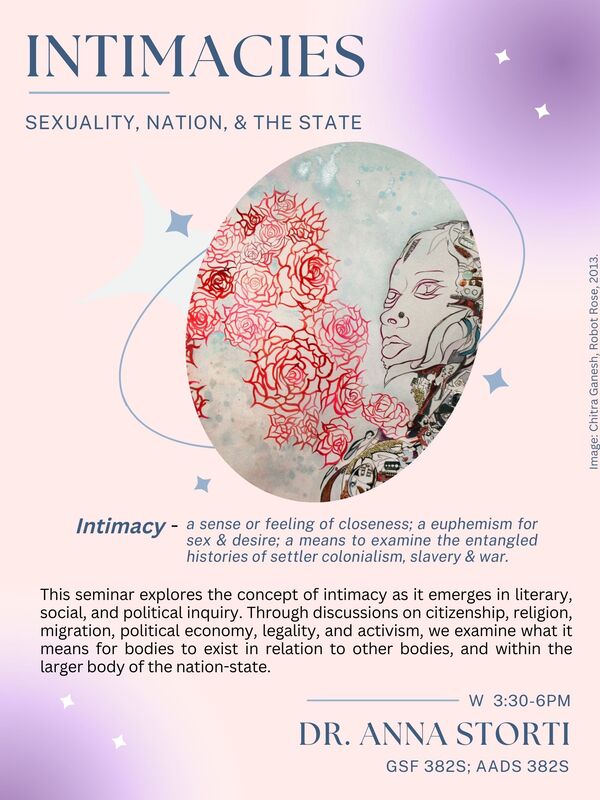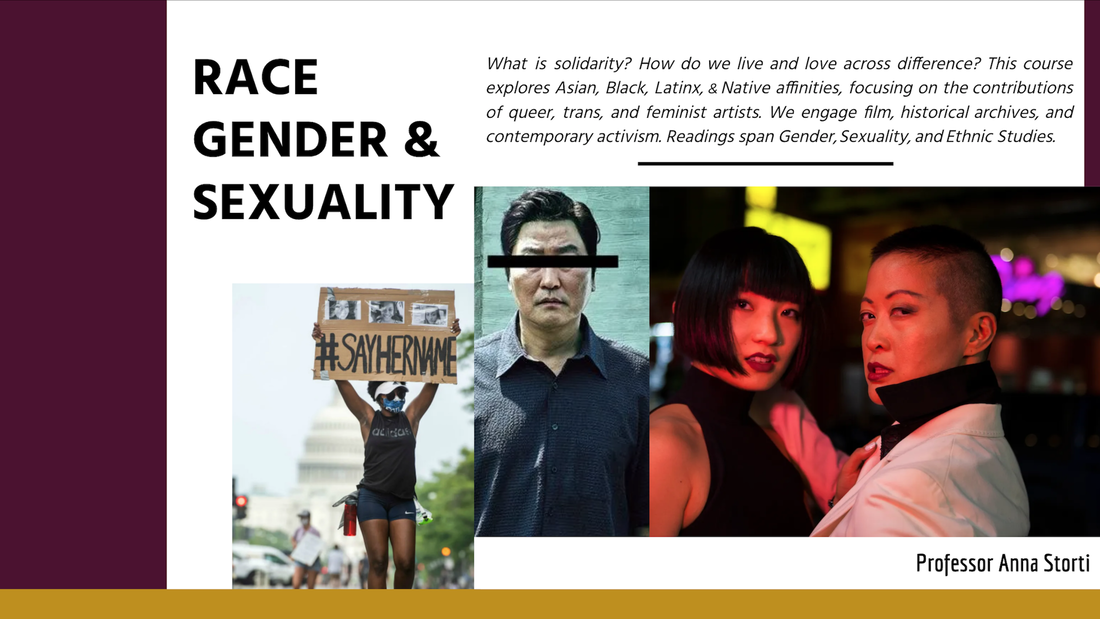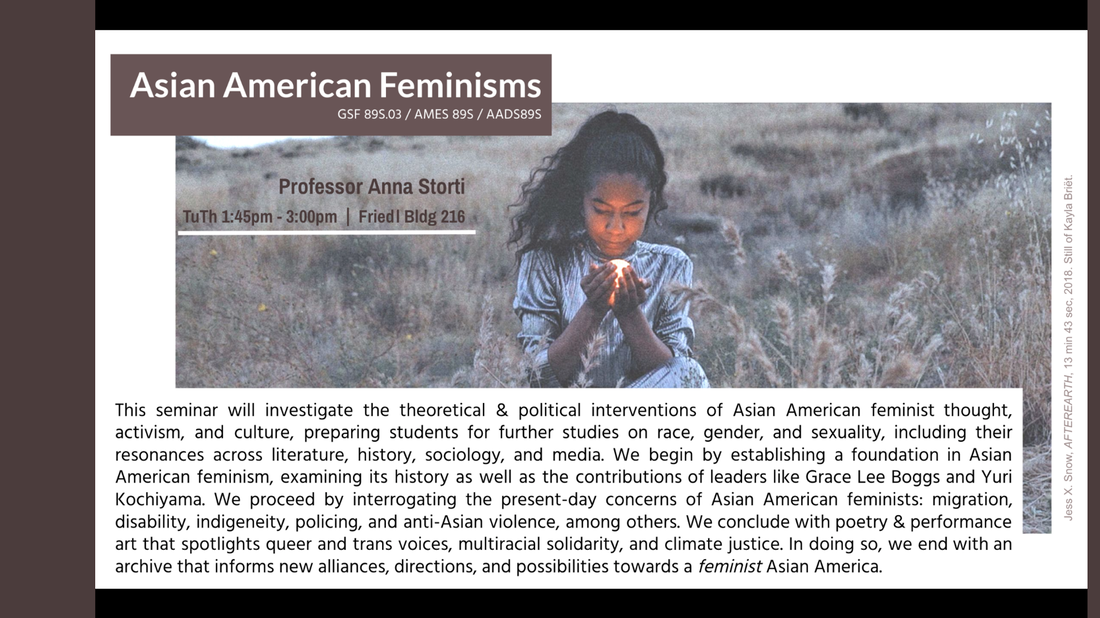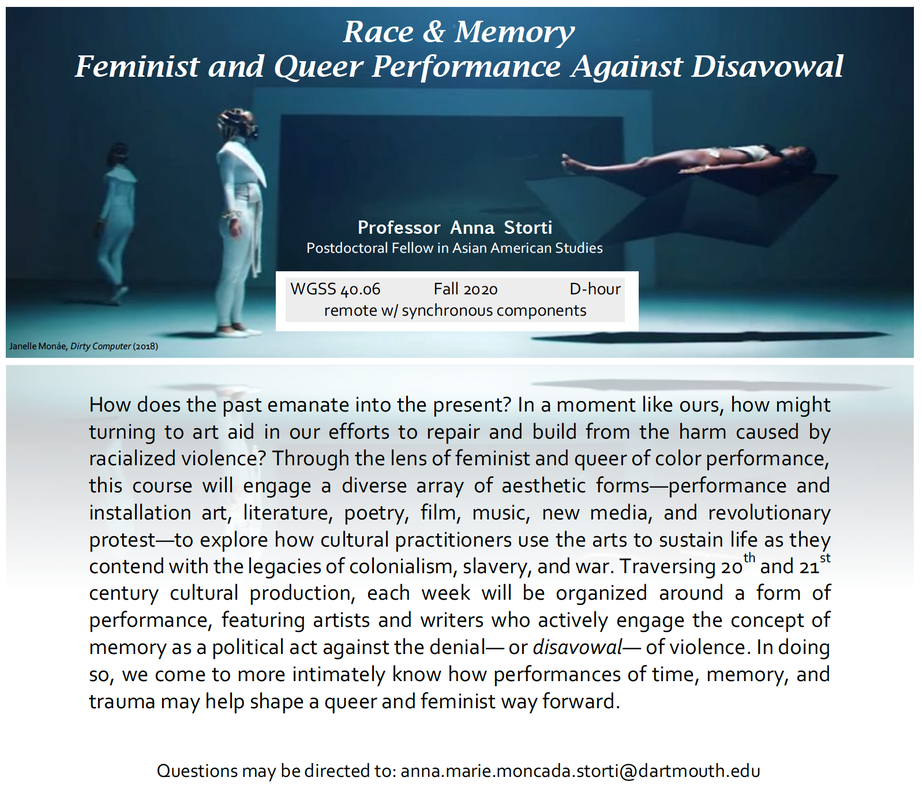|
Much like my research, the courses I offer revolve around issues of race, gender, and sexuality, and the interconnected legacies of colonialism and imperialism. My syllabi feature work both germinal to and at the cutting edge of feminist thought, centering work produced by queer and trans people of color.
As a professor, my goals are twofold: 1) to ensure that students acquire the analytical skills needed to contextualize the challenges that define our moment, and 2) to collectively envision creative ways to both endure and rebuild an increasingly precarious world. No matter their major, students leave my classes with a shaper understanding of the humanities, and, in the best cases, a lasting impulse to question power and work towards a world more capable of nourishing us all. In the classroom, I work alongside students, offering direction, historical context, and theoretical foundations as we delve into the fields of gender studies and critical ethnic studies. Inspired by my undergraduate education in ethnic studies, as well as my doctoral training in feminist pedagogy, my teaching style extends methods of community accountability and active listening. In doing so, I facilitate discussion in an effort to model a way of relating across difference that I believe is at the heart of any desire for social transformation. Below you will find a list of courses I've taught at Duke University, Dartmouth College, and the University of Maryland. Please get in touch if you'd like a copy of the syllabus. |
Photo by John West
Durham, NC September 2022 |
|
Asian American Feminisms
Duke University / Fall 2021 |
|
Race and Memory:
Feminist and Queer Performance Against Disavowal Dartmouth College / Fall 2020 |
|
LGBT Film and Video
University of Maryland, College Park / Summer 2018, Summer 2019 (Online, asynchronous) How are LGBT histories, experiences, and desires represented in film and video? This course offers a broad look into the rich field of queer media studies in order to answer this question. Focusing on several key genres, mediums, and themes in queer media cultures and scholarship, we will explore the ways in which sexuality, gender, class, race, and nation are visualized on screen. We begin the course building a foundation in theoretical and methodological frameworks in media studies, visual culture, and queer studies. We then develop proficiency in a queer critique on visual media. The remainder of the course centers queer historical and diasporic narratives as represented in film. Course topics include the representation of deviant sexualities, femme/butch aesthetics, HIV and AIDS, racialization, queer diasporic and queer postcolonial narratives, mixed media, and transgender perspectives. This course does not attempt to represent all arenas of LGBT and queer films, nor is it designed to be an introduction to film and media studies. The course does incorporate fundamental media studies concepts so that students can apply them to the films and videos we watch. Students will learn to incorporate disciplinary visual analysis with a cultural analysis of ideology, cultural production, and LGBTQ history. |
|
Introduction to LGBT Studies
University of Maryland, College Park / Fall 2017, two sections in Spring 2018 Mainstream coverage of LGBT politics often centers marriage equality, workplace inclusion, or hate crime laws; however, a much richer political and social history exists. Focusing on academic writings and cultural productions - including films, poetry, and autobiography - by and about LGBTQ people, this course provides a broad interdisciplinary perspective on the range of investments, practices, and desires of LGBT people and communities. Organized thematically, this course traverses humanities and social science fields in order to examine how sexuality and gender play an integral role in history, politics, culture, philosophy, and the everyday. Throughout this course, students will work towards a deep understanding of the ways in which institutional and interpersonal dynamics of power, privilege, and oppression specifically affect LGBTQ people and social movements. We begin by developing a foundation in intersectional thinking; we will learn how the social constructions of sex, gender, and sexuality are connected to the social categories of race, ability, nationality, class, and religion. We then trace some of the histories of LGBT activism and social movements as we branch out into themes of criminalization, health, and national belonging. We conclude the course by imagining and debating future directions of LGBTQ life, culture, and justice. |
|
Women, Art, and Culture
University of Maryland, College Park / Fall 2016, two sections in Spring 2017 TA for Dr. Katie King in Fall 2015 “Women, Art, and Culture” is an introductory course in the Department of Women’s Studies. As an interdisciplinary field of study, Women’s Studies draws from multiple scholarly perspectives in order to study issues of power and difference. During the semester we analyze women, art, and culture alongside race, sexuality, citizenship, and capitalism in order to consider how creative expression serves as a means to enact political change, resist oppressive systems, and imagine new societal possibilities. Throughout the course you will develop a basis in the field’s major interventions including intersectionality and the matrix of domination. We begin with an overview of methods; in this portion of the semester you will familiarize yourself with different ways of analyzing structures of power and difference. In the remainder of the semester, you put these methods to practice; by traversing artistic and academic texts you will analyze power and difference on an individual level, a community level, and a structural level, respectively. The cultural practice of storytelling serves as an overall frame and approach to the course; stories demand us to intimately connect to difference. Rather than focus solely on telling our stories, this course asks us to embrace the role of the listener. Reading, listening, and witnessing stories act as methods of examining complex relations of power and difference as well as ways of envisioning modes of transformation. |
|
LGBT People and Communication - TA for Dr. Luke Jensen
University of Maryland, College Park / Fall 2016, Fall 2017 This course is offered as a collaboration between LGBT Studies and the LGBT Equity Center. The course offers a study of differences, stereotypes and values distinguishing LGBT people and effective means of communicating such differences to non-LGBT people. Emphasis on contemporary LGBT life and on the development of didactic skills. Preparation and presentation of forums on LGBT people; facilitation of workshops in various outreach locations (residence halls, Greek system, classes). My primary work as TA was serving as the Speakers Bureau Coordinator for the LGBT Equity Center over the course of two years. As the coordinator, I trained undergraduate LGBTQ and allied students to communicate the varied experiences, differences, stereotypes, and values of LGBTQ people to non-LGBTQ people. The students I oversee develop communication, facilitation, and didactic skills. They are prepared to educate their peers in classrooms across the campus and student groups including those affiliated with the Health Center, Multicultural Involvement and Community Advocacy, Greek life, residence halls, and honor societies. Because my students are asked to engage in and respond to challenging and politically-charged topics, I train them to navigate their interactions as listeners first, exemplifying the type of thoughtful and conscientious citizen I believe our world needs. |
|
Bodies in Contention - TA for Dr. Ashwini Tambe
University of Maryland, College Park / Spring 2016 This course explores how and why women’s bodies serve as sites of controversy. How do women’s bodies become a source of personal anxiety over matters such as beauty, personal hygiene, and gender identity? How do women’s bodies symbolize the identities of larger social groups? What are the consequences when women’s bodies as treated as cultural and national property? What strategies have women’s movements taken to prioritize pleasure and tackle violence? We will explore such questions first at an intimate individual level, and then move outwards to consider national and transnational movements and controversies. The readings will include analyses of how women’s bodies are represented, why controversies emerge about them, and how feminists engage with these debates. Our approach is interdisciplinary, drawing on research from a variety of fields such as anthropology, sociology, psychology, history and literature. |
